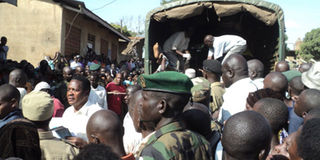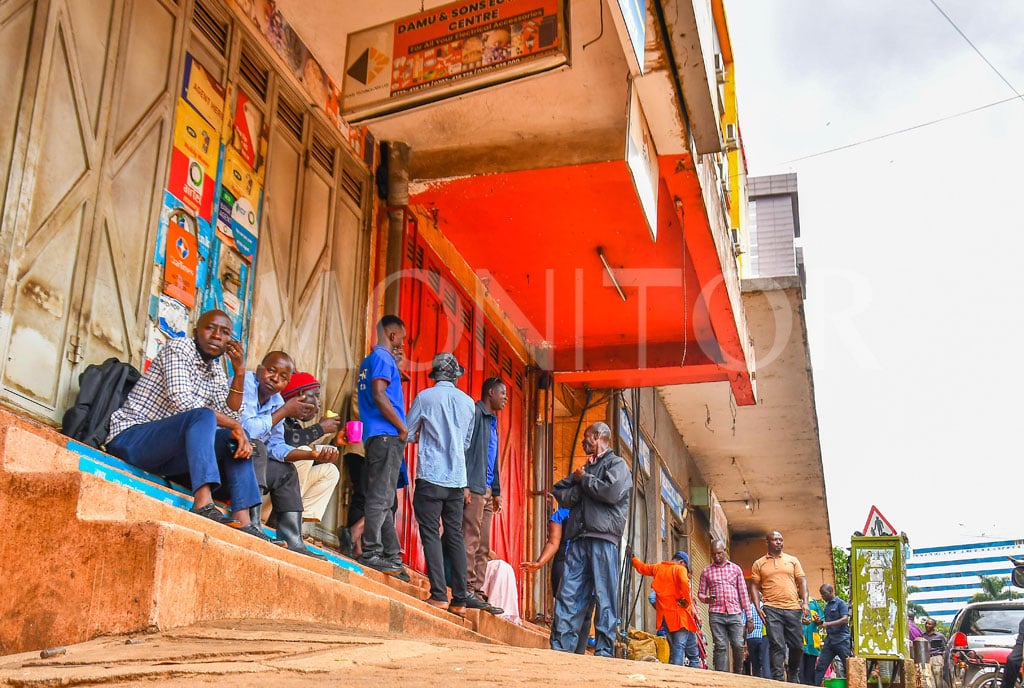What do the recent gun attacks mean for the country?

Crowds gather as the bodies of people killed by a soldier at the former army headquarters in Bombo, are put onto a truck. Photo by Dan Wandera.
What you need to know:
The recent attack on Mbuya barracks is one of the incidents where the question of gun control comes into play. Just who is supposed to handle guns in this country?
A quick succession of incidents involving attempts at snatching guns from either a security installation or individual security personnel, which littered media reporting, came with a sense of alarm, forcing security officials to retreat into a defensive mode accusing the media of causing excitement through sensational reporting.
On March 4, about 30 men are said to have raided the barracks with an aim of snatching a gun. Official statements from both the police and the military initially stated that neither the raiders nor their motive was known. Later the bunch was reduced to mere thugs who were after getting a gun to aid robbery missions. Three men are being tried before the army Court Martial for the incident, while a fourth attacker reportedly died at the scene earning praise for the guard who put him out of action.
A few days later, a gun was stolen from a police post at Mpala, along the Kampala-Entebbe highway. At the former army headquarters, Bombo a crazed soldier shot 10 people dead and fled. Another incident in Jinja involving an alleged attempt to steal a gun from two female security guards turned out to be a simple love game involving the female guard and her lover and nothing serious.
What is the motive?
Army and defence spokesman Col. Felix Kulayigye in a brief statement to the media about the attack on Mbuya barracks said “the intention of these thugs is not yet clear but police and other security agencies are carrying out investigations to establish their motive”. The caginess on the “intention of these thugs” and a further paragraph promising to release details of an investigation is believed to have been the inadvertent spark of the speculation about the incident being the work of subversives.
“The public will be informed of the outcome of the investigations as soon as they are concluded. Anyone with information in this regard is encouraged to share it with the UPDF; it will be treated with utmost confidence. The public is asked to remain calm. UPDF, as usual will do whatever it takes to ensure the prevailing peace is not disturbed,” Col. Kulayigye said.
Experts believe nothing serious of a political nature can come out of the recent spate of gun snatching incidents in Kampala and districts around it. But questions still linger on whether there is a link between the incidents.
This newspaper understands that though the army and police were quick to brash off any links to rebellion in the Mbuya attach, many in security were taken by surprise. It is understood that for years, a section in security has invested thousands of hours tracking and building a case for plans of armed rebellion, which for a government that has faced at least 25 armed rebellions in 27 years of its existence, the briefs about armed rebellion have found many willing listening ears.
In an interview, Kampala Metropolitan police commander Andrew Felix Kawesi dismissed the incidents as works of ordinary criminals insisting that gun thefts, including from security personnel or facilities, is not an uncommon occurrence in the country.
Kawesi insists the incidents, though happening in quick succession do not represent a pattern and are not linked.
“The incident in Bombo was the action of a single crazed individual who had a personal score to settle,” Kawesi said.
Former MP and minister Aggrey Awori also ruled out a political motive in the attacks, arguing that “only a person out of his mind would try to take Mbuya,” But he was quick to add that “an AK47 is handy equipment for people wanting to stock their arsenal” for things like robberies.
Is there a link between the spates?
Other analysts have tried to create a link between the incidents, especially the Mbuya attack and the government/ security coup talk that dominated part of January as an extension of a well calculated political scheme to keep stubborn politicians under check.
This school of thought argues that once a pattern is established, then handling of political opponents through linking them to rebellion is easy. Believers in this kind of thought say, it is easy, with evidence of an attack to conclude an investigation in any direction.
‘Rebellion not a viable option’
Awori, a respected security analyst, especially during his days in the 6th Parliament, argues that a return to rebellion in today’s Uganda cannot be a “viable political option.”
Having gained his credentials from partly playing a role in the 1985 coup that overthrew Obote and being partly linked to infantile attempt at rebellion in eastern Uganda in the early years of Museveni, he however says even if the motive was simply acquiring guns for robbery, the choice of Mbuya looks suspicious, especially in a country saturated with guns.
“There is nothing characteristic about that spate of attempts to snatch guns linked to a political motive,” he said while acknowledging that a few guns in wrong hands are capable of making governance in the city difficult.
But promoters of the theory of rebellion will look back 32 years ago to the war that eventually brought Museveni to power to argue that, the shortest guerrilla struggle relied on rudimentary acquired weapons and that out of 41 rebels who initially entered the bush, 27 of them were armed.
Accounts of the Bush War, including President Museveni’s book, Sowing the Mustard Seed describe in heroic terms, transportation of a single gun or even ammunition to their side of the struggle. People who kept or aided the movement of a single gun have been recipients of medals in recognition for their contribution to the struggle.
Despite efforts to contain illegally held guns in the country, including international efforts against illicit small arms, Uganda remains one of the countries with the highest number of such guns.
Apart from authorised security personnel in both government and private security personnel move around with their guns. Hundreds and possibly thousands of individuals still carry guns and often brandish them without much provocation.
The country has also witnessed a significant rise in gun crime – a spate of murders of Muslim clerics was done with guns whose origin is still unknown.
A poorly paid security personnel including police and the military, has also been linked to guns that have committed crimes like murder or robberies as they are believed to rent them out to thugs.
Whether the recent attacks had criminal or political linkages is something that cannot and may not be established now but the country needs reassurance that everything is in control.




